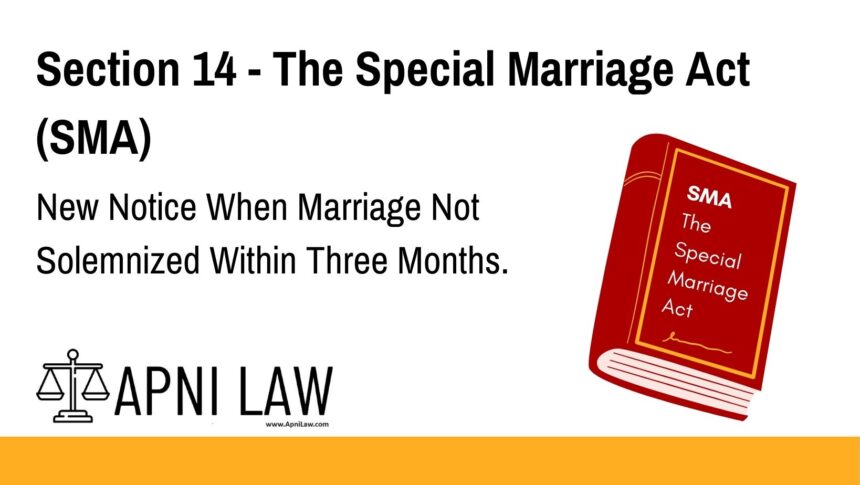Code: Section 14
Whenever a marriage is not solemnized within three calendar months from the date on which notice thereof has been given to the Marriage Officer as required by section 5, or where an appeal has been filed under sub-section (2) of section 8, within three months from the date of the decision of the district court on such appeal or, where the record of a case has been transmitted to the Central Government under section 10, within three months from the date of decision of the Central Government, the notice and all other proceedings arising therefrom shall be deemed to have lapsed, and no Marriage Officer shall solemnize the marriage until a new notice has been given in the manner laid down in this Act.
Explanation of Section 14 of the Special Marriage Act
Section 14 deals with what happens when a marriage is not completed within a specific time frame after giving notice under the Special Marriage Act. According to this provision, couples have a maximum of three months to solemnize their marriage after giving notice to the Marriage Officer under Section 5.
If the marriage is delayed beyond this limit—for any reason—then the original notice becomes invalid. This rule also applies in cases where:
- An appeal was filed under Section 8(2), and three months have passed since the district court’s decision.
- The case was referred to the Central Government under Section 10, and three months have passed since the Government’s decision.
In all of these scenarios, the earlier notice and related proceedings expire. As a result, the couple must submit a fresh notice if they still wish to get married under the Act.
This ensures that marriage intentions remain current and verified, and it prevents indefinite delays in the legal process.
Illustration
Example 1: Expired Notice After 3 Months
Aman and Priya give notice of their intended marriage on January 1st. Due to personal delays, they don’t solemnize the marriage by March 31st. As the three-month window expires, their original notice lapses. Now, they must file a new notice under Section 5 before proceeding.
Example 2: Appeal-Related Delay
Reena and Sameer face an objection to their marriage and the case goes to the district court under Section 8(2). The court approves their marriage on June 1st. They must marry within three months—by August 31st. If not, they’ll need to issue a new notice.
Common Questions and Answers on Section 14 SMA
1. Why is there a three-month time limit?
The time limit ensures that the intention to marry remains recent and verified. It also keeps the registration process legally and socially relevant.
2. What happens if a couple misses the deadline?
The notice lapses. They must restart the process by submitting a fresh notice under Section 5.
3. Can the time limit be extended?
No, the Act does not provide for an extension. A new notice is the only option after the lapse.
4. Is the new notice process the same as the first one?
Yes. The couple must submit the notice, wait 30 days, and follow the same steps as before for solemnization.
5. Does this apply even if the delay is due to appeal or government review?
Yes. Whether the delay is from appeal (Section 8) or government action (Section 10), the three-month rule still applies after the final decision.
Conclusion
Section 14 of the Special Marriage Act plays a crucial role in keeping the marriage registration process timely and efficient. If the couple does not marry within the given three-month window—whether from notice, appeal, or government decision—they must begin the process again. This legal reset keeps the system clear, fair, and up-to-date.
Want more legal clarity on marriage procedures? Visit ApniLaw for expert breakdowns and trusted legal content.








